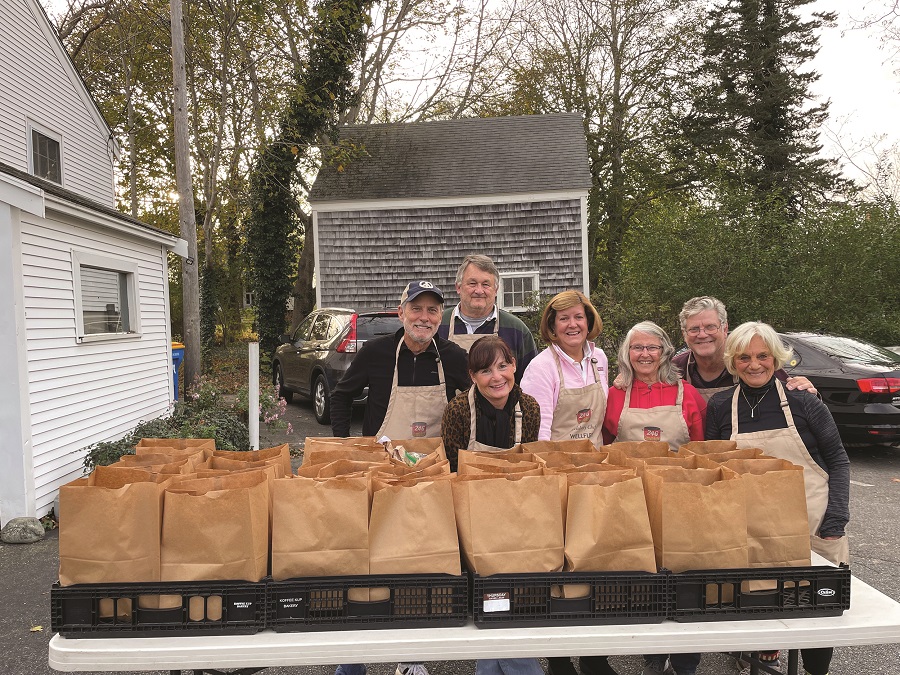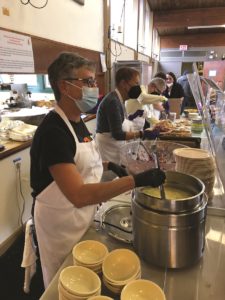TRURO — In all three of Cape Cod’s outermost towns, community kitchens have come to serve an important role in fighting off the twin worries of the off-season here: diminished income and increased social isolation. In Provincetown and Wellfleet, shared meals in winter have been a tradition for years, while in Truro, a Covid-era startup has been delivering meals to people’s doorsteps every Tuesday night all year long.
Wendy Lurie and Eli Sobel were part of a small group that started the Truro Community Kitchen as a pandemic relief effort in April 2020, just weeks after the Covid shutdowns began in mid-March. Along with Lucy and Nick Brown, Tom Roda, David Sobel and Julie and Frank Grande, who own Box Lunch, they started out cooking in the Box Lunch kitchen, none of them sure how long the community’s need for free meals would last. But as Covid’s “imminent threat waxed and waned,” Sobel says, “the number of meals we served stayed extremely consistent.”
Later that summer, the parent and child co-directors moved their operation to the kitchen at the Christian Union Church at 27 Shore Road where they prepare about 100 meals for delivery every Tuesday evening. At the height of the Covid crisis, Sobel says, they were sending out nearly 180 dinners a week.
The 246 Community Kitchen in Wellfleet began 10 years ago “with a little bit of a community supper in the Methodist church,” says its director, Janet Drohan. As the community’s need escalated, the kitchen became its own nonprofit, although it’s still located at the United Methodist Church at 246 Main St. It’s a nonsectarian enterprise that “feeds anyone and everyone,” Drohan says, like its counterparts in Truro and Provincetown.

The 246 Community Kitchen distributes between 50 and 60 quarts of soup, in addition to a salad and a loaf of bread, for pickup every Tuesday. The number was higher — 80 or 90 — before the pandemic. The in-person white-tablecloth community suppers that were the norm pre-Covid are set to resume this coming January, Drohan says.
The Soup Kitchen in Provincetown, affectionately known as SKIP, has been serving meals at Provincetown’s United Methodist Church at 20 Shank Painter Road since 1992. SKIP serves lunch every weekday from early November until the end of April, with New Year’s Day the only exception — because not many people showed up during the years they stayed open.
SKIP serves roughly 150 lunches each weekday and provides an extra meal on Fridays for people to take home for the weekend. Phil Franchini, SKIP’s chair, says the organization served around 18,000 meals last year, which is about double the number from 10 years ago. During Covid, the shared dining experience had to become a drive-through instead, but SKIP continued serving about 160 meals per day.
All three community kitchens serve people without asking questions about their income. As an all-delivery organization, the Truro kitchen’s volunteer team includes many drivers. When someone calls to request a meal, Sobel asks for the address, the number of people dining, and any allergy information. Each family gets a brown bag with a numeric code, but no names, Lurie says.
As for the 246 Community Kitchen, “We’re trying to embrace people who are generally lonely,” says Drohan. They feed the elderly and the young, families who live here, and AmeriCorps volunteers far from home. And as with SKIP, town lines are not a consideration, Drohan says. People are welcome to take part in 246 community meals regardless of where they live.

“Many who come are not food-challenged,” Drohan says; their donations help fund meals for those who are. The kitchen has five rotating teams of volunteers. Drohan says that being on deck once every five weeks keeps her teams happy and creative.
Franchini estimates that SKIP meals are currently running about 50-50 between dining room and take-out service. “Our goal is not only to feed people,” he says, “but to offer them companionship.”
SKIP’s 100 or so volunteers also rotate, although typically they work one set day per week. Even though SKIP has grown considerably in the last few years, Franchini sees it getting even busier, “because food has gotten so expensive.”
Local food pantries have also seen a significant increase in demand because of rising food prices, as the Independent reported in its Nov. 2 edition.
The Truro kitchen receives donations from the Truro food pantry and occasionally has gotten ingredients from SKIP when they have food to spare. Primarily, though, they rely on the generosity of individual donors. At its first Thanksgiving in 2020, the kitchen received an anonymous donation of 50 individual meals to be distributed to whoever needed them.
One of the Thanksgiving meal recipients sent Sobel and Lurie a note thanking them for keeping the pandemic holiday from feeling lonely and enclosed a check for $1,000. “The takeaway there is that need looks so different for so many different people,” Sobel says.
The 246 Community Kitchen gets most of its food from the Greater Boston Food Bank and also receives local donations of meat and produce. During Covid, “the most heartwarming thing,” Drohan says, “was the donation of 60 loaves of bread every week from PB Boulangerie.”
SKIP, which has three paid employees — a dishwasher, a chef, and an office coordinator — in addition to 10 unpaid board members, receives roughly half of its food from the Greater Boston Food Bank, with the rest being purchased with donations. A significant amount of its funding comes from the Sponsor a Lunch Program, through which individuals or businesses can fully support one day’s lunch with a $250 donation.
Franchini expects about 200 people to come for SKIP’s Thanksgiving meal this year — a day that is almost always one of the busiest of the whole winter season.




